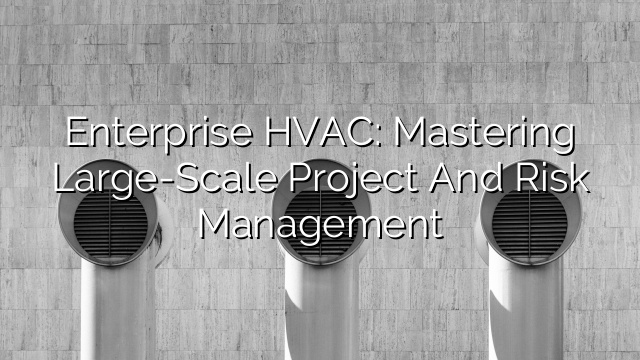Introduction
Managing large-scale HVAC projects can be a complex task, especially when it comes to budgeting. With multiple components, teams, and resources to coordinate, staying on top of the financial aspects of such projects can be challenging. However, with the right techniques and strategies in place, you can master budgeting for enterprise-level HVAC projects and ensure their successful execution.
1. Define a Clear Scope
Before diving into budgeting, it is crucial to define a clear scope for your HVAC project. This includes identifying the specific goals, deliverables, and key milestones. By having a well-defined scope, you can accurately estimate costs and allocate resources accordingly.
2. Conduct a Thorough Cost Analysis
Performing a comprehensive cost analysis is a fundamental step in budgeting for large-scale HVAC projects. This involves identifying and estimating all potential expenses, including equipment, labor, materials, permits, and any other operational costs. Consider any contingencies that may arise and factor them into your budget to avoid unexpected financial overruns.
3. Seek Competitive Bids and Quotes
When budgeting for enterprise-level HVAC projects, it is essential to seek competitive bids and quotes from various suppliers and contractors. By obtaining multiple options, you can compare prices and negotiate better deals, ultimately optimizing your budget. Take the time to research reputable vendors and request detailed proposals that include all necessary costs.
4. Allocate Resources Wisely
Efficient resource allocation is crucial for successful budgeting in large-scale HVAC projects. Consider the size and complexity of the project when determining the number of workers and equipment needed. Prioritize tasks and allocate resources accordingly to ensure that you have the right personnel and tools in place at each stage of the project.
5. Implement Effective Project Management Tools
Utilizing project management tools can streamline budgeting for enterprise-level HVAC projects. These tools can help you track expenses, monitor progress, and manage resources effectively. Choose a project management software that aligns with your organization’s needs and provides robust budgeting and reporting features.
6. Monitor and Update Budget Regularly
Budgeting for large-scale HVAC projects is an ongoing process that requires regular monitoring and updates. Keep an eye on your expenses and compare them to your initial budget. If you notice any discrepancies or unexpected costs, make necessary adjustments to ensure that your project stays within its financial constraints.
7. Collaborate with Stakeholders
Collaboration with stakeholders is vital for effective budgeting in enterprise-level HVAC projects. Engage early with all relevant parties, including project managers, finance departments, and key decision-makers. By involving stakeholders from the start, you can gain valuable insights and ensure that the budgeting process aligns with organizational goals and expectations.
8. Consider Energy Efficiency Measures
Incorporating energy efficiency measures into your HVAC project can have long-term cost savings. Evaluate opportunities for energy-efficient equipment, technologies, and design choices. Although energy-efficient options may come with higher upfront costs, they can lead to significant savings in operational expenses over the project’s lifespan.
9. Anticipate and Address Challenges
Large-scale HVAC projects often come with their fair share of challenges. It is essential to anticipate these challenges and incorporate appropriate contingencies in your budget. This could include factors such as changes in scope, unexpected weather conditions, or delays in materials delivery. By proactively addressing potential challenges, you can mitigate their financial impact on your project.
10. Continuously Improve Through Lessons Learned
After completing a large-scale HVAC project, take the time to reflect and assess the budgeting process. Identify any lessons learned and areas for improvement. Document these insights and share them with your team to enhance future budgeting efforts and strengthen overall project management practices.
FAQs
Q: How do I estimate the costs for a large-scale HVAC project?
A: To estimate costs for a large-scale HVAC project, conduct a thorough cost analysis by identifying all potential expenses, including equipment, labor, materials, permits, and operational costs. Seek competitive bids and quotes from multiple suppliers and contractors to compare prices and negotiate better deals. Consider the scope of the project and allocate resources accordingly.
Q: How can project management tools help with budgeting for large-scale HVAC projects?
A: Project management tools can streamline the budgeting process by helping track expenses, monitor progress, and manage resources effectively. These tools offer features such as budget tracking, cost estimation, and reporting, enabling project managers to stay on top of financial aspects and make informed decisions.
Q: What are some common challenges in large-scale HVAC projects?
A: Common challenges in large-scale HVAC projects include changes in scope, unexpected weather conditions, delays in materials delivery, and unforeseen technical issues. It is crucial to anticipate these challenges and incorporate appropriate contingencies in the budget to mitigate their financial impact.
Q: How can I ensure that my large-scale HVAC project stays within its budget?
A: To ensure that your large-scale HVAC project stays within its budget, monitor and update the budget regularly. Compare actual expenses to the initial budget and make necessary adjustments. Collaborate with stakeholders, involve them in the budgeting process, and seek their input. Anticipate and proactively address challenges to minimize financial impacts. Continuously learn from past projects and improve your budgeting process.






